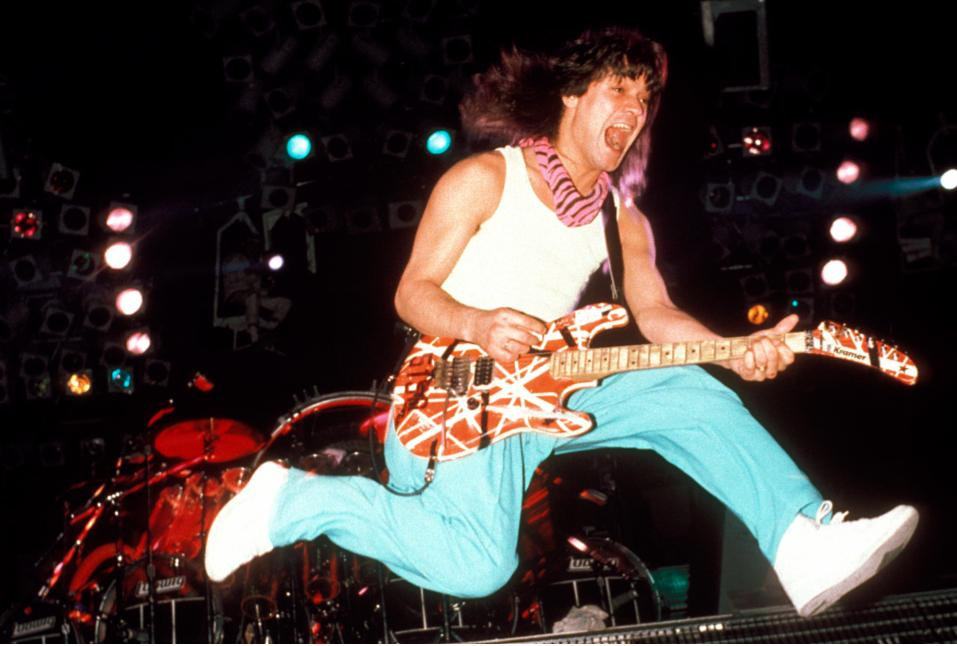Virtuoso guitarist Eddie Van Halen passed away at the age of 65 on October 6, 2020. He played lead guitar in the 19th best selling group of all time; Van Halen. He was a wildly innovative player who influenced many of those who came after him and popularized the technique of two-handed tapping.
A native of the Netherlands, Van Halen was born on January 26, 1955. He immigrated to the U.S. with his family when he was in his teens. They took up residence in Pasadena, California. Eddie was originally a drummer while his brother Alex, also a musician, played guitar. They later switched roles in the band they christened after themselves in 1974, Van Halen. Bandmates included lead singer David Lee Roth and bassist Michael Anthony with Eddie Van Halen on guitar and Alex on drums. The group shot to stardom in 1978 by releasing their eponymous debut. The record had something for everyone. For pop aficionados, there was the catchy single “Jaime’s Cryin,” and for metalheads, there were blistering numbers like “Ain’t Talkin Bout’ Love” and “Runnin’ with the Devil.” All of it, though, was touched by Eddie’s revolutionary playing. Perhaps the most noteworthy track on the album was his blazing guitar instrumental “Eruption.” Rolling Stone magazine put it like this, “It’s only slightly hyperbolic to say that there’s rock guitar soloing pre- Eruption, and then there’s everything that came after.”
The band followed their success with four more platinum-selling albums. “Van Halen II” their immediate follow up record had a lighter, carefree feel. Van Halen again threw in a guitar instrumental, this time named “Spanish Fly,” a flamenco like piece done on a nylon string guitar. It dared to cross genre lines, but the rest of the album followed the debut’s formula for the most part. The band’s next two albums, “Women and Children First” and “Fair Warning,” had a noticeably darker atmosphere. Around this time in 1981, Eddie Van Halen married actress Valerie Bertinelli who was five years his junior. In 1982, the band released their next L.P. “Diver Down,” which was widely regarded as a disappointment. It only clocked in at 32 minutes and was saddled with no less than three cover songs. In its 2-star review for the album, Rolling Stone called it a “cogent case of consumer fraud.” Eddie Van Halen resented the bands record label Warner Bros. for pushing the band to release an album when they didnt have enough quality material for one. The band was at a crossroads
Eddie Van Halen was also a very talented keyboard player, and “Fair Warning” featured a keyboard instrumental. But on “1984,” Van Halen’s 6th album, a full array of synths was incorporated into the singles with notables like “I’ll Wait” and “Jump.” It was clearly an attempt to crossover fully into the pop mainstream, and it worked! “Jump” went to the top of the Billboard Hot 100, becoming one of the defining songs of the 80s in the process. The band proved that they could still rock with their next single, “Panama,” which ranked among their heaviest songs and hit #13 on the pop charts. They were at the height of their popularity when lead singer David Lee Roth left the band, in a shock development, to pursue a solo career. Roth was as much a symbol of the band with his charismatic unschooled vocal style, as Eddie Van Halen was with his flashy guitar playing. Now Van Halen had to find someone to take his place.
Van Halen at first, considered an unusual choice, female singer Patty Smyth of Scandal, but she declined because she was pregnant at the time. In the end, he settled on Sammy Hagar, an industry veteran who had been on the American rock scene since 1973. He was known for his blustery, assured vocal delivery. There were many doubts about whether Van Halen could continue their success with a new lead singer. Many other bands ceased to exist after losing such an integral part of their presence. But Van Halen stunned the world with 1986’s “5150,” which was a massive commercial success. It became the band’s first album to top the Billboard 200. It marked the bands first venture into power ballads with titles like “Why Can’t This Be Love” and “Love Walks In.” Synthesizers were featured even more prominently. But in doing so, the band alienated a part of their core audience who were disgruntled with the band’s direction. The same year tragedy struck when Van Halen’s father Jan, who was a clarinetist, died at 66 of a heart attack. The next album, “OU812,” was dedicated to him. It continued in the poppier, commercialized vein of “5150,” again the album charts.
Finally, in 1991, the band attempted to make their third album with Hagar as lead singer a return to rocking form. “For Unlawful Carnal Knowledge” boasted the band’s heaviest single since “Panama” with “Poundcake.” Eddie also included a guitar instrumental named 314 in reference to his first child Wolfgang’s birthday earlier in the year on March 14. But at the same time, the musical environment was turning sharply against the type of flashy pop rock that the band paraded. Grunge had taken the world by storm. The band took nearly three years to get back in the studio as many bands took hiatus, and they had to ask themselves whether to continue or adapt to the new emerging styles. For Van Halen, the answer was to stay the course. In 1995 “Balance” was released, and it showed the band was taking little chances with their music. Meanwhile, tensions between Eddie Van Halen and Hagar exploded. Hagar later recounted that he was being pressured by Van Halen to record a new album, which he hadnt wanted to do so soon after the birth of his child. Whatever the case, Hagar was fired in 1996.
Eddie forged on by choosing Gary Cherone, formerly of Extreme as the next lead singer. But their only L.P. with him, “Van Halen III,” was widely ridiculed and panned by critics. Interestingly Eddie Van Halen sang lead for the first time on this album on a song called “How Many Say I.” In 2000, he was diagnosed with tongue cancer, though he waited until 2001 to announce his diagnosis publicly. In a statement he said, Im sorry for having waited so long to address this issue personally. But cancer can be a very unique and private matter to deal with I was told (by my doctors) that Im healthier than ever and beating cancer. Unfortunately this pronouncement was premature, as his cancer would return in time even though he did recover for a period.From 1999 to 2003, the band took a four year hiatus, perhaps dispirited by the failure of their previous album but possibly due to Eddies ill health as well. In 2004 they reunited with Hagar for a tour, but the reunion was quickly aborted after acrimony surfaced once more. Then from 2007 to 2015, the band reunited with Roth taking three tours and releasing an album. In the last years of his life, Eddie maintained a low profile. As an avid smoker, the habit likely contributed to his multiple bouts with cancer. The ultimate cause of his death was throat cancer.
Eddie Van Halen revolutionized guitar playing in every imaginable way. Never before had a guitarist blazed up and down the fretboard with such blinding speed. The L.A. Times called him an "All American guitar hero whoredefined the sounds and possibilities of the electric guitar in the 1970s and '80s". I admire EVH personally, because he didnt try to build off of someone elses old ideas, instead he invented an entirely new way of doing things that was truly original and creative. I think thats something that applies not just to the greats of the music industry but to all innovative figures across the board.
Appleford, S. (2020, October 7). Eddie Van Halen dead: Guitar god for a generation was 65. Los Angeles Times. https://www.latimes.com/obituaries/story/2020-10-06/eddie-van-halen-guitar-dies-65
Billboard. (2001, April 27). Eddie Van Halen Confirms Cancer Diagnosis. https://www.billboard.com/articles/news/79952/eddie-van-halen-confirms-cancer-diagnosis
Bienstock, R., Beaujour, T., & Grow, K. (2020, October 6). Eddie Van Halens 20 Greatest Solos. Rolling Stone. https://www.rollingstone.com/music/music-lists/eddie-van-halen-20-greatest-guitar-solos-778991/aint-talkin-bout-love-1978-784217/
Copeland, C. (2020, October 7). What really caused Sammy Hagar and Eddie Van Halens feud in the 90s. Grunge.Com. https://www.grunge.com/257643/what-really-caused-sammy-hagar-and-eddie-van-halens-feud-in-the-90s/
Eddie Van Halen. (2020, October 7). Biography. https://www.biography.com/musician/eddie-van-halen
| Van Halen | Biography, Albums, Streaming Links. (2020). AllMusic. https://www.allmusic.com/artist/van-halen-mn0000260206/ |
 Haralambos Liberatos, Alumni at UCTech
Haralambos Liberatos, Alumni at UCTech 
 Interview with Mrs. Mansfield-Smith, Principal of Magnet High School
Interview with Mrs. Mansfield-Smith, Principal of Magnet High School